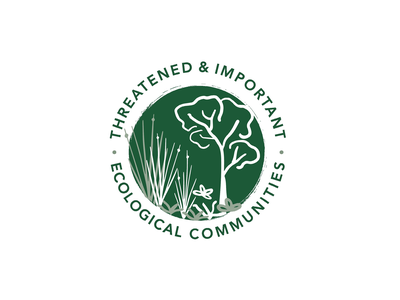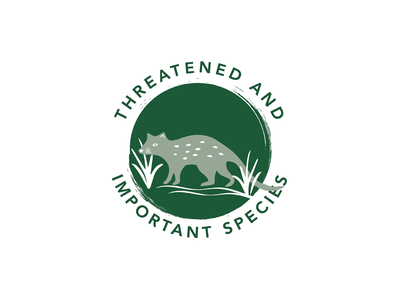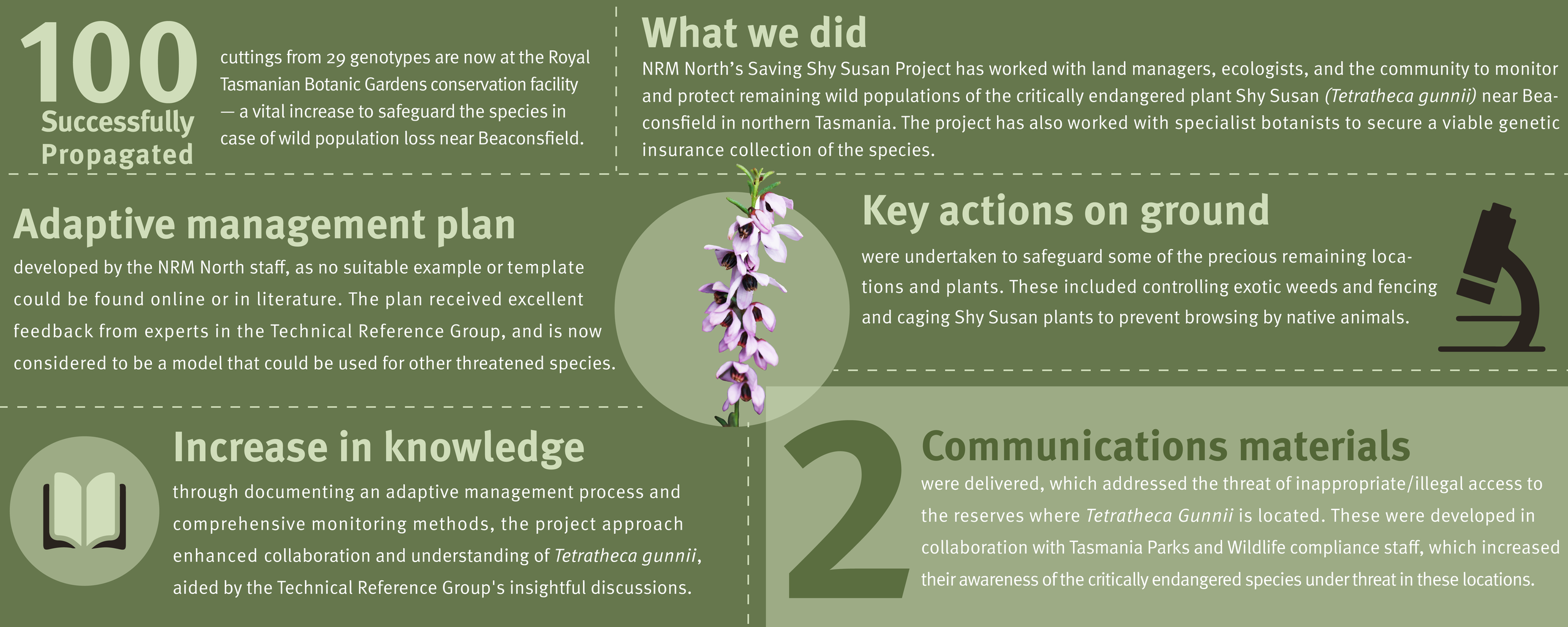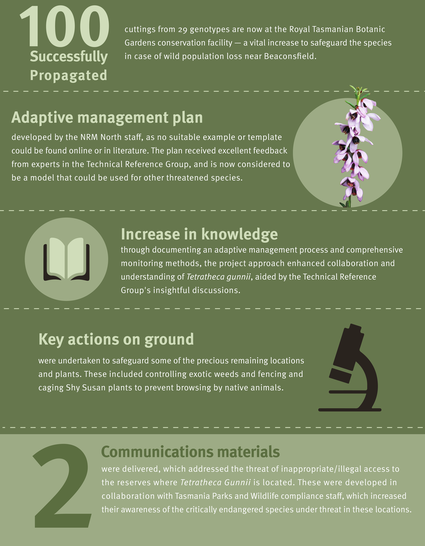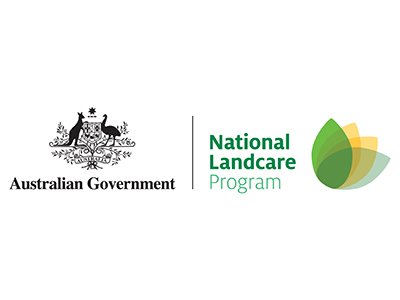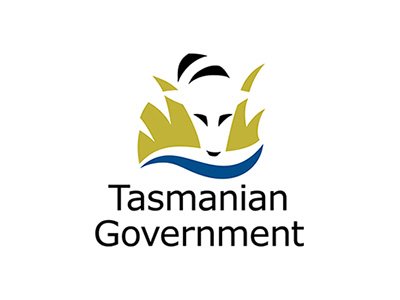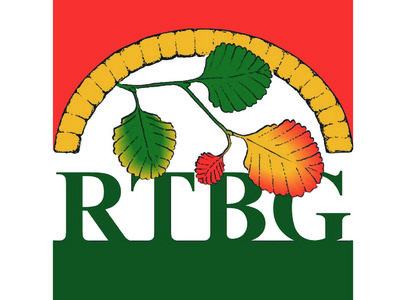Saving Shy Susan Project
The Saving Shy Susan Project aimed to safeguard the remaining sub-populations of the critically endangered plant Shy Susan (Tetratheca gunnii).
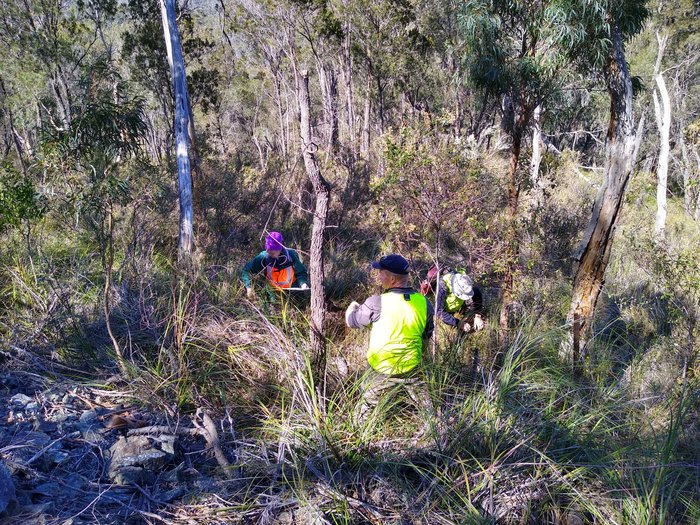
Focus
Focus
Shy Susan is a native purple-flowering herb endemic to serpentine soils in the Dazzler Range near Beaconsfield, Tasmania. The species was listed as extinct until its rediscovery in 1986 and is now listed as critically endangered under the Commonwealth Environment Protection and Biodiversity Conservation Act 1999. While serpentine outcrops occupy 530 ha in the Beaconsfield area, the known sub-populations of T. gunnii occupy only approximately 0.6 ha in total, and often co-occurs with other threatened endemic understorey species such as pretty heath (Epacris virgata) and creeping dustymiller (Spyridium obcordatum).
Shy Susan is threatened by seed-bank removal, inappropriate fire regimes (both too frequent and too infrequent), browsing by native wildlife, habitat disturbance, and the introduction of weeds and disease (e.g. root rot fungus Phytophthora cinnamoni) from illegal firewood harvesting, off-road vehicle use, and mineral exploration.
The Saving Shy Susan Project implemented, and adapted on-ground strategic actions to conserve the species, and
secure a viable genetic collection of T. gunnii.
Building on outcomes achieved through previous Australian Government investment, the project worked with specialist botanists, public land managers, and the local Beaconsfield community to strengthen protection measures for known wild sub-populations of the Shy Susan, promote the health of vegetation communities at known wild sub-population sites, and trial and monitor interventions considered most likely to improve the species conservation trajectory. The existing insurance population of the T. gunnii held at the Royal Tasmanian Botanic Gardens was also supplemented. The project concluded in June 2023.
Shy Susan was listed as extinct until its rediscovery in 1986. It is now listed as critically endangered.
Shy Susan was listed as extinct until its rediscovery in 1986. It is now listed as critically endangered.
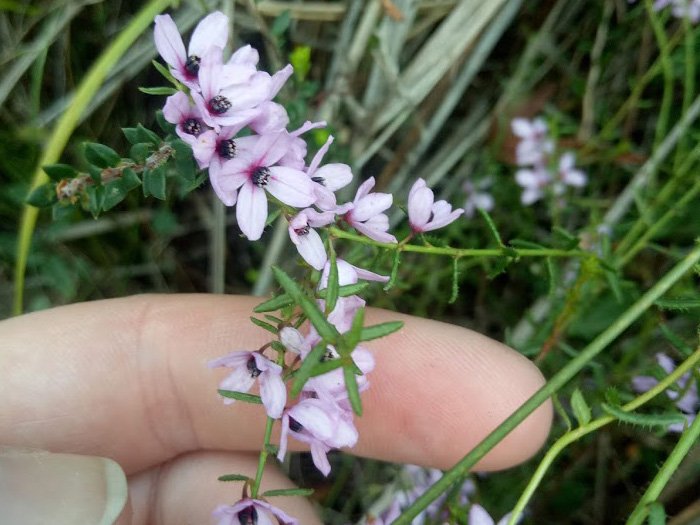
Shy Susan (Tetratheca gunnii) is a small, straggling herb with delicate purple flowers that emerge from September to December. Image courtesy Lauren Bird.
Achievements
- - - - - - - - - - - - - - - - - - -
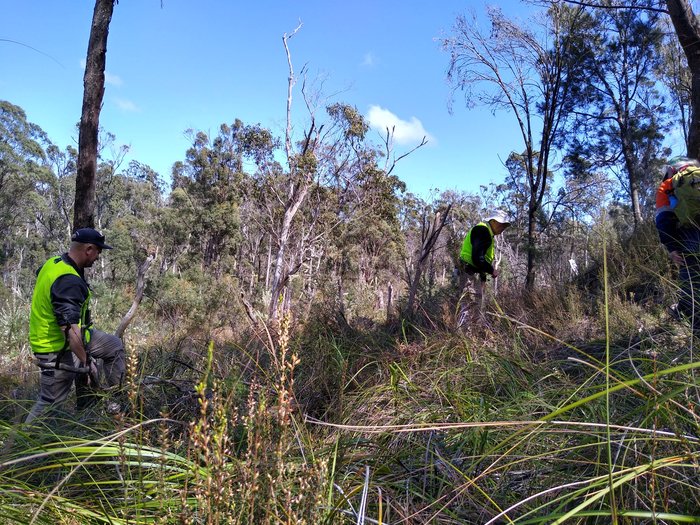
Volunteers assist NRM North staff in the search for Shy Susan plants during the 2021 spring annual population census.
Saving Shy Susan Project - Case study
Saving Shy Susan Project - Case study
Biodiversity Coordinator Lauren Bird collaborated with members of the species reference committee to develop the first adaptive management plan and monitoring plan specific to Shy Susan.
Key actions were undertaken to safeguard some of the precious remaining locations and plants, which included a population census, controlling exotic weeds, and fencing and caging Shy Susan plants to prevent browsing by native animals.
On-ground interventions were a critical component of efforts to stabilise populations of T. gunnii. Sustaining the species will require ongoing monitoring and adaptive and responsive actions.
“Refining monitoring and management requirements for Shy Susan has been a critical process for understanding and formally documenting the species’ requirements for survival. Through this project, we have developed a legacy process that outlines the ongoing actions required to stabilise and improve the trajectory of the wild population beyond this funded project.”
“Refining monitoring and management requirements for Shy Susan has been a critical process for understanding and formally documenting the species’ requirements for survival. Through this project, we have developed a legacy process that outlines the ongoing actions required to stabilise and improve the trajectory of the wild population beyond this funded project.”
Lauren Bird
Lauren Bird
Get involved
NRM North continues to take an active interest in the conservation of Shy Susan, supporting annual population monitoring by volunteers. A survey completed in October 2021 revealed there are less than 200 Shy Susan plants remaining in the wild.
Sustaining the species will require ongoing monitoring and adaptive and responsive actions. You can help by sourcing your firewood sustainably:
- Seek firewood from suppliers who source their wood legally from forestry operations and plantations, or are members of the Firewood Association of Australia
- Don’t be afraid to consider other suppliers if a seller cannot tell you where their wood has come from
- If you’re collecting your own firewood, obtain all appropriate permits and approvals prior to collection, or consider collecting waste wood from production forests. Learn more at sttas.com.au
- Report suspicious or illegal wood harvesting activity to Bush Watch on 131 444.
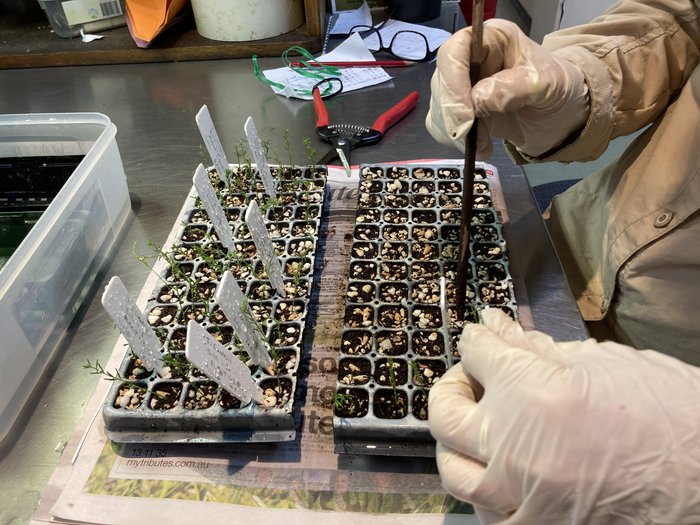
Partners
This project was supported by NRM North, through funding from the Australian Government's National Landcare Program.
Partners
This project was supported by NRM North, through funding from the Australian Government's National Landcare Program.
